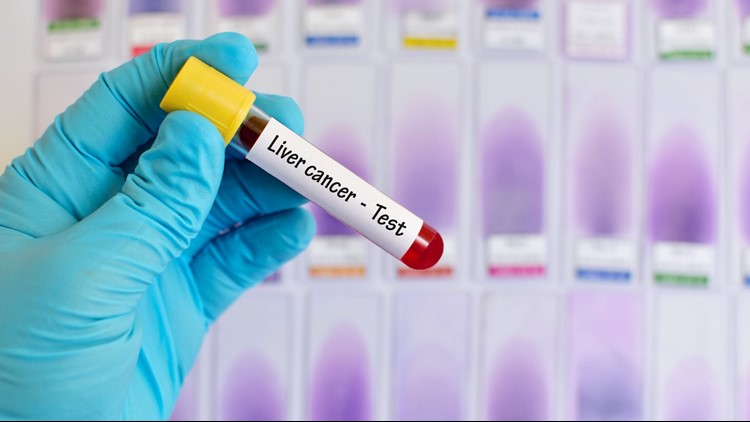KUSA — On the 9th of every month, we encourage you to check your health and tell a friend to check themselves as part of Buddy Check9 Day.
For the month of July, we're focusing on liver Cancer.
Below is information compiled by the American Cancer Society, Colorado Cancer Alliance and HealthONE.
July 28 is World Hepatitis Day! Do you know if you are at risk for hepatitis? Take this 5-minute quiz to find out: https://www.cdc.gov/hepatitis/riskassessment/
Symptoms and Risk Factors
Signs of liver cancer sometimes do not show up until the later stages of the disease. Some symptoms can also be caused by other conditions. It is still important to follow-up with your healthcare provider.
Symptoms may include:
• Loss of appetite
• Nausea or vomiting
• Swelling or fluid buildup in the abdomen
• Pain in the abdomen or near the right shoulder blade
• Feeling very full after a small meal
• Weight loss, without trying
For more information visit https://www.cancer.org/cancer/liver-cancer/detection-diagnosis-staging/signs-symptoms.html
Hepatocellular carcinoma is the most common form of liver cancer in adults. The following risk factors may make a person more likely to develop the disease:
• It is more common in men than in women
• Asian Americans and Pacific Islanders have the highest rates of liver cancer in the United States
• Chronic infection with the hepatitis B or hepatitis C virus
• Individuals with cirrhosis have an increased risk of liver cancer
For more information on risk factors visit https://www.cancer.org/cancer/liver-cancer/causes-risks-prevention/risk-factors.html
Lifestyle Changes
Some liver cancers may be prevented if people reduce exposures to known risk factors for the disease. The following are things people can do to reduce their risk:
• Limiting alcohol and tobacco use
• Getting to and maintaining a healthy weight
• Avoiding and treating hepatitis infections
• Limiting exposure to cancer-causing chemicals
• Treating diseases that can increase liver cancer risk
For more information visit https://www.cancer.org/cancer/liver-cancer/causes-risks-prevention/prevention.html
Need Answers about Hepatitis C? Call toll free, 1-800-522-HEPC(4372). The Liver Health Connection’s HelpLine is a nationally recognized source for caring, knowledgeable counselors that answer questions and protect your confidentiality. http://www.liverhealthconnection.org/national-helpline
If you would like to receive a FREE and CONFIDENTIAL hepatitis C test, contact Liver Health Connection at 1-800-522-4372
We encourage you to get tested if:
• You were born between 1945 and 1965
• Injected or snorted drugs, even once
• Received a tattoo outside of a licensed setting
• Had sexual contact with someone who is hepatitis C positive
• Received blood products before 1992 or outside the U.S.
• Have ever been on hemodialysis
• Are a veteran, especially of the Vietnam war
• Are a healthcare worker or first responder
The screening takes about twenty minutes to return results and requires a simple finger prick.
Learning about a hepatitis C viral infection (HCV) diagnosis can be an overwhelming experience, and Liver Health Connection is here to help. There’s an extensive resource directory available here:
What’s a deep maroon color, looks like a squashed football and works 24/7 keeping you detoxed? Answer: your liver. And that hard-working organ is facing surprising new threats from your dinner plate and medicine cabinet.
First, some background. Your liver skims toxins from your bloodstream, metabolizes drugs, filters and repackages 99 percent of nutrients from your diet (mostly into blood sugar, but also into triglycerides and cholesterol) and produces fat-digesting bile.
Until about a decade ago, the biggest threats to your liver were hepatitis infections and alcohol abuse. Now, over-dosing on acetaminophen is the number-one cause of sudden liver failure in the U.S. Unsafe herbal medications and supplements, such as the fat-burning pill that recently caused 24 cases of liver disease, two liver transplants and one death in Hawaii, are also responsible for ever-more hepatic disorders. But around the corner there's something even worse. The next wave of liver problems will be launched by our expanding epidemic of obesity.
Over-doing calories (especially from red meat and sugary drinks) is the reason 33 percent of adults have non-alcoholic fatty liver disease (NAFLD) – a fat build-up in liver cells that leads to swelling, scarring or even liver failure for up to half of those with the condition. Within five years, fatty liver – due to obesity – could be the new number-one reason for liver failure and the need for liver transplants in the U.S.
You can’t feel the slow build-up of fat, though your doctor can identify liver problems early with an ultrasound or later via a routine blood test. (Be sure to ask for liver readings at your next physical.) But don’t wait for bad news. Here’s how to keep your liver healthy and show it a little more love every day.
1. Stop seeing (and eating) red. A diet packed with red meat boosts body-wide inflammation and raises your risk for a fat-packed liver by 45 percent. Munching four ounces a day triples your risk compared to folks who indulge once in a while.
2. Put more fish and green veggies on your plate. Seafood, like salmon and ocean trout, is rich in omega-3 fatty acids that discourage fat build-up in the liver. So does purified omega-7. Veggies, such as asparagus, contain minerals and amino acids that help liver cells detox themselves. And broccoli and cabbage contain sulfur compounds that help your liver clear toxins from your body.
3. Say so-long to sugary drinks. They raise fatty liver odds by 45 percent. The reason: Fructose in soft drinks (and other sweet treats) revs up the liver’s production of fats. In their place, wet your whistle with coffee and tea. Caffeine stimulates the breakdown of lipids stored in liver cells. There’s evidence that four cups of coffee or tea a day could help prevent NAFLD.
Here’s Here’s our favorite “liver health elixir”: A quarter-cup of warm water flavored with the juice of one lemon wedge and two dashes of hot pepper sauce. Warm water aids digestion, lemon juice packs inflammation-soothing vitamin C and the capsaicin in hot pepper helps your liver do its job.
4. Say, “cheers,” but not too often. One crazy night of binge drinking – in two hours, downing four or more drinks if you’re a woman, five or more if you’re a man – can seriously harm your liver. And 30 percent of women and 40 percent of men do that at least once a year. You can slow down your alcohol intake with a glass of water before and after each drink, or try non-alcoholic beer.
5. Don’t believe in magic pills. Avoid all herbs, supplements and packaged formulas with a cocktail of ingredients. Far too often, they contain drugs not listed on the label while missing what they claim to provide. Only buy supplements certified by the U.S. Pharmacopeial Convention. And that acetaminophen? Sure it relieves pain, but stick with the dose on the label and never combine with alcohol.
Content Provided by Sarah Cannon Cancer Institute at HealthONE.



